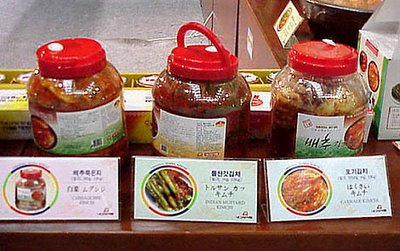I love Kimchi
 I was introduced to Kimchi in the mid 80’s and have loved it ever since. I would open the lid and eat it straight out of the jar with chopsticks. Actually after a recent story featuring Kimchi on our news I mentioned to my daughter we need to go buy some. It has been awhile for me and my mouth is watering thinking about it. Where I am from, we would have to go to Pensacola, FL to purchase a jar or two. It was only a 30 minute drive, but unless you had other business there you shopped locally at home, no quick expressway. Living in this area, I’m sure we have many places to purchase from, however we called one place and they are sold out – on back order. Now I have this uncontrollable craving! (smiling) For the ones not familiar with Kimchi, this is a little background.
I was introduced to Kimchi in the mid 80’s and have loved it ever since. I would open the lid and eat it straight out of the jar with chopsticks. Actually after a recent story featuring Kimchi on our news I mentioned to my daughter we need to go buy some. It has been awhile for me and my mouth is watering thinking about it. Where I am from, we would have to go to Pensacola, FL to purchase a jar or two. It was only a 30 minute drive, but unless you had other business there you shopped locally at home, no quick expressway. Living in this area, I’m sure we have many places to purchase from, however we called one place and they are sold out – on back order. Now I have this uncontrollable craving! (smiling) For the ones not familiar with Kimchi, this is a little background. Sauerkraut could fight bird flu, say scientists
News.Telegraph-UK reports
Sauerkraut, the dish adored in Germany but much maligned in Britain, could prove to be a secret weapon against the threat of bird flu, experts revealed.
Scientists believe that the traditional recipe, which is made from chopped cabbage that is fermented for at least a month, contains a bacteria that may combat the potentially fatal disease.
Their findings follow a study in which kimchi - a spicy cabbage dish popular in South Korea and similar to sauerkraut - was fed to 13 chickens infected with bird flu. Just one week later, 11 of the birds showed signs of recovery from the virus.
"The feed has been shown to help improve the fight against bird flu or other types of flu viruses," said Prof Kang Sa-ouk, who led the research at Seoul National University, yesterday.
Prof Kang's team claims that lactobacillus, the lactic acid bacteria created during the fermenting process, is the active ingredient that could combat bird flu.
Health experts have already agreed that there may be some truth to kimchi's curative properties, prompting an increase in the consumption of the dish in South Korea.
Sales of sauerkraut in the United States have also soared as a result of the research, and now Britain is starting to catch on. Last night, importers of the dish to Britain said that sales were rising and they were increasing stocks in the expectation that demand could escalate.
Geoff Hale, the commercial manager for Euro Food Brands, said: "Sales are very buoyant at the moment. We bring in about half-a-million jars of sauerkraut to Britain from Germany every year and that number is definitely going up."
Sales of sauerkraut were up 20 per cent on this time last year at Sainsbury's, according to a spokesman for the supermarket.
Whether or not sauerkraut does cure bird flu, the dish is said to have a number of other health benefits, among them cancer-fighting and detoxifying properties.
It is also a rich source of vitamins.
One serving, which contains only 32 calories and has four grams of fibre, provides 102 per cent of the recommended daily intake of vitamin K, 12 per cent of iron and 35 per cent of vitamin C.
Prof Richard Mithen, from the Institute of Food Research, in Norwich, said: "Eating kimchi or sauerkraut may be good for your health and help fight off infections.
"I wouldn't recommend anyone rushing out to stock up on sauerkraut specifically to fight off bird flu, but it may help your immune system."
A further study on sauerkraut, carried out recently by Polish and American scientists, concluded that the meal might be the reason for the lower breast cancer rate observed among Polish immigrants in America.
Another Source:
Kimchi represents Korea's best known food. Koreans serve kimchi at almost every meal, and few Koreans can last more than a few days before cravings get the better of them. During the 1988 Summer Olympic Games, thousands of foreigners were introduced to it for the first time. Despite a reputation for being spicy, most people usually develop a taste for it, and many foreigners also find themselves missing it after returning to their home country.
How to make Kimchi Click Here
History of Kimchi Click Here
Effective Feb 2006 All comments have been saved and hidden due to transferring to Haloscan 18 Comments






































<< Home